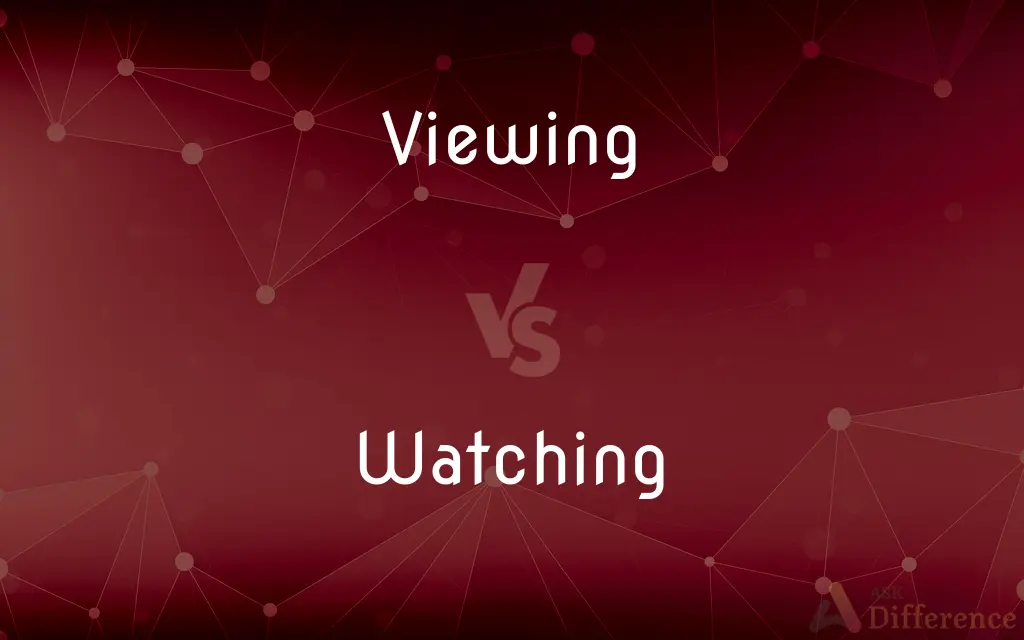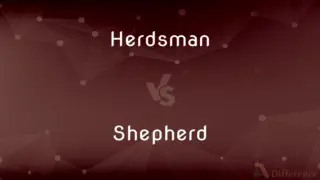Viewing vs. Watching — What's the Difference?
By Maham Liaqat & Fiza Rafique — Updated on April 1, 2024
Viewing emphasizes a more passive engagement or observation, often without a specific focus, while watching implies active attention and intent to observe specific details or actions.

Difference Between Viewing and Watching
Table of Contents
ADVERTISEMENT
Key Differences
Viewing is generally considered a passive activity, where one might be exposed to visual content without a deliberate effort to engage deeply. It suggests a broader, more general act of seeing. For instance, viewing art in a gallery involves looking at different pieces, often without a focused critique. Watching, on the other hand, is an active process. It involves paying close attention to something or someone, often with a specific purpose or interest in mind. Watching a movie, for example, entails focusing on the plot, characters, and visual details to fully understand and enjoy the experience.
The context often dictates the choice between viewing and watching. Viewing is used in contexts where observation is more general or casual, such as viewing landscapes during a drive. Whereas watching is more appropriate when there’s a need for detailed attention, like watching a documentary to learn about a specific topic.
The level of engagement also differentiates the two. When someone is viewing something, they might not be as emotionally or intellectually invested in what they're seeing. This contrasts with watching, where the observer is more likely to be engaged, reacting to, and processing what they see on a deeper level.
The intent behind the act can also be a distinguishing factor. Viewing can be for appreciation or leisure without seeking deep understanding, like viewing paintings. Watching is often goal-oriented, with the intent to observe changes, actions, or details, such as watching a surveillance feed for security reasons.
Comparison Chart
Engagement
Passive, less focused
Active, detailed attention
ADVERTISEMENT
Purpose
General observation or leisure
Specific intent to observe or learn
Context
Broader, e.g., viewing art or scenery
More focused, e.g., watching a movie or a match
Emotional Investment
Lower
Higher
Typical Usage
Appreciation, leisure
Learning, entertainment, monitoring
Compare with Definitions
Viewing
The act of seeing or inspecting something.
Viewing the city skyline from the rooftop was breathtaking.
Watching
Observing something carefully, with attention to detail.
Watching the chef prepare the meal was a learning experience.
Viewing
Attending a showing, such as of a house or a film.
We have a viewing scheduled for the open house this Saturday.
Watching
Keeping under observation, especially to protect or control.
The guard was watching the entrance all night.
Viewing
Observing visual content without deep engagement.
Viewing paintings at the museum can be a relaxing activity.
Watching
To look at something for a period, especially something that is changing or moving.
We spent the evening watching the stars.
Viewing
The act of examining or considering something.
Viewing the problem from a different angle may help us find a solution.
Watching
To follow an event or activity on television or other media.
We are watching the football game live.
Viewing
To look at photographs or other visual content, especially casually.
Viewing old photos brought back many memories.
Watching
To stay awake for the purpose of guarding or observing.
She was watching over her sick child throughout the night.
Viewing
The act of seeing, watching, or examining.
Watching
To look or observe attentively or carefully; be closely observant
Watching for trail markers.
Viewing
The act or an instance of watching a movie or television.
Watching
To look and wait expectantly or in anticipation
Watch for an opportunity.
Viewing
A gathering of people in the presence of the body of a deceased person as an act of remembrance and consolation prior to burial or cremation.
Watching
To act as a spectator; look on
Stood by the road and watched.
Viewing
Engaged in watching a movie or television
A poll of the viewing audience.
Watching
To stay awake at night while serving as a guard, sentinel, or watcher.
Viewing
Present participle of view
Watching
To stay alert as a devotional or religious exercise; keep vigil.
Viewing
An instance of viewing something.
The agent took them to the property for a viewing.
I hated the film at first, but with subsequent viewings it has grown on me.
Watching
To look at steadily; observe carefully or continuously
Watch a parade.
Viewing
A wake.
Watching
To guard, keep surveillance on, or spy on
Watched the prisoner all day.
Watched the house to see who came and went.
Viewing
The display of a motion picture
Watching
To observe the course of mentally; keep up on or informed about
Watch the price of gold.
Viewing
A vigil held over a corpse the night before burial;
There's no weeping at an Irish wake
Watching
To pay close attention to or be careful about, especially with regard to propriety
Watched his manners.
Watching
To tend or take care of (children or a flock of sheep, for example).
Watching
Present participle of watch
Watching
The act of one who watches.
Watching
The act of observing; taking a patient look
Common Curiosities
Is watching TV the same as viewing TV?
Watching TV implies actively following a program, while viewing TV might just mean having the TV on without actively engaging with it.
Is viewing the same as watching?
No, viewing is more passive and general, while watching involves active attention.
Do emotions play a role in viewing vs. watching?
Yes, watching often involves higher emotional investment, whereas viewing is more detached.
Is it possible to switch between viewing and watching?
Yes, one might start by viewing something casually and begin watching more actively if it captures their interest.
How do you decide whether to use "viewing" or "watching"?
Consider your level of engagement and intent; use "watching" for active engagement and "viewing" for casual observation.
Does watching always require visual focus?
While watching typically involves visual focus, it can also include monitoring changes or details through other senses.
Why do people say "viewing a movie" in some contexts?
"Viewing a movie" can imply a more casual or passive watching experience, or it might be used in contexts like film studies where the focus is on analysis.
Can viewing be considered an active activity?
Typically, viewing is seen as passive, though one can actively engage in viewing art or scenery with a more thoughtful approach.
How does technology influence our viewing and watching habits?
Technology provides more opportunities for both, with streaming services for watching and platforms like social media for viewing.
Can viewing be enriching or informative?
Yes, viewing can be enriching, especially when appreciating art, scenery, or casually observing details.
Is there a difference in how we process information when viewing vs. watching?
Yes, watching typically involves more active processing and engagement with the content.
How does context affect whether we view or watch something?
Context such as the content (art vs. a sports game) and the environment (gallery vs. stadium) can influence whether we view or watch.
Can you watch something without understanding it?
Yes, it’s possible to watch something, like a foreign film without subtitles, and not fully understand it.
Is watching more common for certain activities?
Watching is more common for activities requiring focus and understanding, like movies or sports.
Can the same activity be both viewing and watching?
Yes, the distinction often depends on the observer’s level of engagement and purpose, which can change even during the same activity.
Share Your Discovery

Previous Comparison
Derive vs. Calculate
Next Comparison
Herdsman vs. ShepherdAuthor Spotlight
Written by
Maham LiaqatCo-written by
Fiza RafiqueFiza Rafique is a skilled content writer at AskDifference.com, where she meticulously refines and enhances written pieces. Drawing from her vast editorial expertise, Fiza ensures clarity, accuracy, and precision in every article. Passionate about language, she continually seeks to elevate the quality of content for readers worldwide.
















































